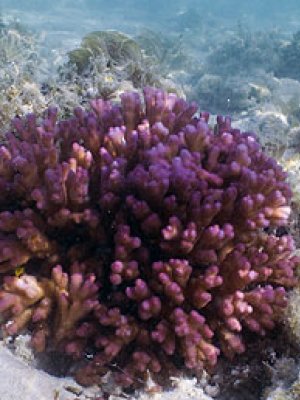
Marine scientists say they are astonished at the spectacular recovery of certain coral reefs in Australia's Great Barrier Reef Marine Park from a devastating coral bleaching event in 2006.
That year high sea temperatures caused massive and severe coral bleaching in the Keppel Islands, in the southern part of the Great Barrier Reef. The damaged reefs were quickly smothered by a single species of seaweed � an event that can spell the total loss of the corals.
However, a lucky combination of rare circumstances meant the reefs were able to achieve a spectacular recovery, with abundant corals re-established in a single year, said Dr Guillermo Diaz-Pulido, from the Centre for Marine Studies at The University of Queensland and the ARC Centre of Excellence for Coral Reef Studies (CoECRS).
Dr Diaz-Pulido said that the rapid recovery was due to an exceptional combination of previously-underestimated ecological mechanisms.
"Three factors were critical," he said.
"The first was exceptionally high regrowth of fragments of surviving coral tissue. The second was an unusual seasonal dieback in the seaweeds, and the third was the presence of a highly competitive coral species, which was able to outgrow the seaweed.
"But this also all happened in the context of a well-protected marine area and moderately good water quality.
"It is rare to see reports of reefs that bounce back from mass coral bleaching or other human impacts in less than a decade or two.
"The exceptional aspect was that corals recovered by rapidly regrowing from surviving tissue," said Dr Sophie Dove, also from CoECRS and The University of Queensland.
"Recovery of corals is usually thought to depend on sexual reproduction and the settlement and growth of new corals arriving from other reefs," she said.
"This study demonstrates that for fast-growing coral species asexual reproduction is a vital component of reef resilience."
Professor Ove Hoegh-Guldberg of the CoECRS and The University of Queensland said that coral reefs globally were increasingly being damaged by mass bleaching and climate change.
Their capacity to recovery from that damage was critical to their future, he said.
"Our study suggests that managing local stresses that affect reefs, such as overfishing and declining water quality, can have a big influence on the trajectory of reefs under rapid global change," Professor Hoegh-Guldberg said.
"Clearly, we need to urgently deal with the problem of rising carbon dioxide in the atmosphere, but managing reefs to reduce the impact of local factors can buy important time while we do this."
Understanding the different mechanisms of resilience is critical for reef management under climate change.
"Diversity in processes may well be critical to the overall resilience and persistence of coral reef ecosystems globally," said Dr Laurence McCook, from the Great Barrier Reef Marine Park Authority.
The research was partially funded by a Pew Fellowship in Marine Conservation awarded to Dr McCook, the Great Barrier Reef Marine Park Authority as well as the ARC Centre of Excellence program.
"This combination of circumstances provided a lucky escape for the coral reefs in Keppel Islands, but is also a clear warning for the Great Barrier Reef," Dr McCook said.
"As climate change and other human impacts intensify, we need to do everything we possibly can to protect the resilience of coral reefs."
The research was published this week in the paper Doom and boom on a resilient reef: Climate change, algal overgrowth and coral recovery, in the journal PLoS ONE, by Guillermo Diaz-Pulido, Laurence J. McCook, Sophie Dove, Ray Berkelmans, George Roff, David I. Kline, Scarla Weeks, Richard D. Evans, David H. Williamson and Ove Hoegh-Guldberg.
Media:
Dr Guillermo Diaz-Pulido, CoECRS and University of Queensland, Ph: 07-3365-3378
Dr Laurence McCook, Great Barrier Reef Marine Park Authority and COECRS Ph: 07 4750-0846, email: l.mccook@gbrmpa.gov.au
Jenny Lappin, CoECRS, + 61 (0)7 4781 4222
Jan King, UQ Communications Manager, +61 (0)7 3365 1120
Images available at: http://www.coralcoe.org.au/


